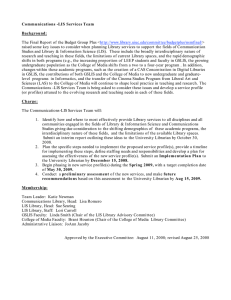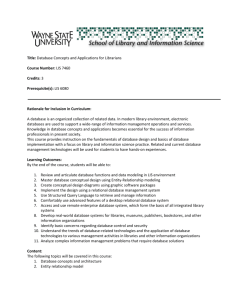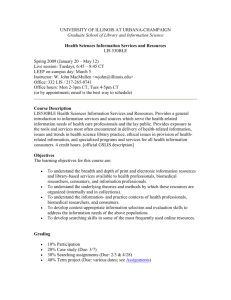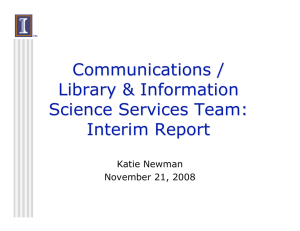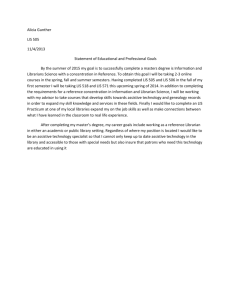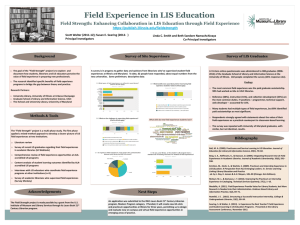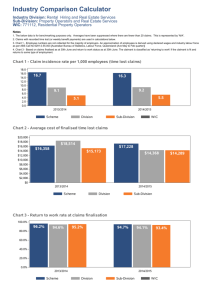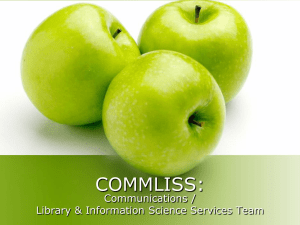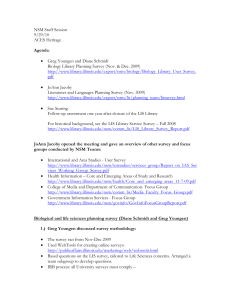Document 11149428
advertisement
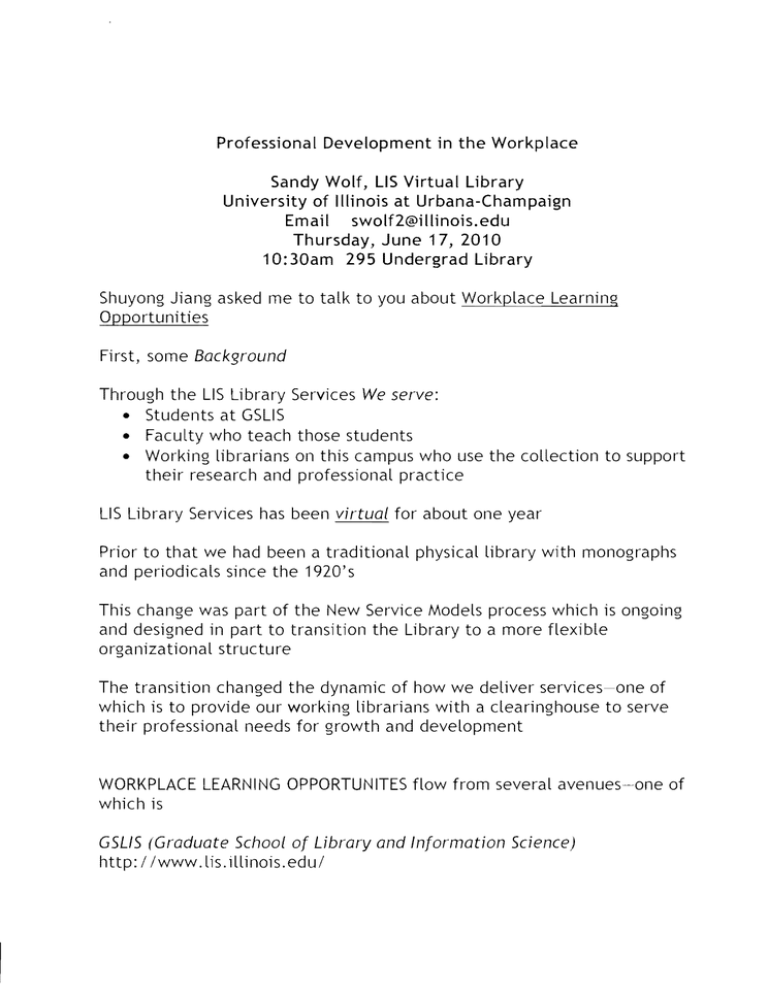
Professional Development in the Workplace Sandy Wolf, LIS Virtual Library University of Illinois at Urbana-Champaign Email swolf2@illinois.edu Thursday, June 17,2010 10:30am 295 Undergrad Library Shuyong Jiang asked me to talk to you about Workplace Learning Opportunities First, some Background Through the LIS Library Services We serve: • Students at GSLIS • Faculty who teach those students • Working librarians on this campus who use the collection to support their research and professional practice LIS Library Services has been virtual for about one year Prior to that we had been a traditional physical library with monographs and periodicals since the 1920' s This change was part of the New Service Models process which is ongoing and designed in part to transition the Library to a more flexible organizational structure The transition changed the dynamic of how we detiver services-one of which is to provide our working librarians with a clearinghouse to serve their professional needs for growth and development WORKPLACE LEARNING OPPORTUNITES flow from several avenues---one of which is GSLIS (Graduate School of Library and Information Science) http://www .lis. illinois.edul LIS Library Services role is to serve as connection to what GSLIS has to offer • Various lecture series-experts within the GSLIS faculty and from around the country and world Lectures are archived into MP3 audio files so can listen to later (mention distance education students) o Often times include an open discussion period with the guest lecturer that encourages information exchange o Examples of topics from this past year = Digital Divide, Informatics, Digital Libraries, • Continuing Professional Development Courses o Certification Programs-usually focus on K-12 school librarian certification, now have a program called Certification in Public Library Administration which focuses on library management • I took an online course in Scholarly Writing last spring Another path for furthering our learning is through .... CARLI [Consortium of Academic & Research Libraries in Illinois] http://www.carli. ill"inois.edu/ We are members of this organization that covers the entire state of IlUnois and bring to us many training opportunities Examples of topics include: • Forums on Resource Sharing • Best Practices 'in Cataloging • Digital Projects throughout the State • Effective use of I Share, our state-wide Online Catalog Lincoln Trail Libraries System which is part of our mUltitype cooperation of Library Systems-serves mostly Public and School libraries, but its membership includes a few academic libraries such as U of I. http://www.Uncolntrail.info/about. html Have a Continuing Education and Training part to their organization Examples of topics are of a more practical nature such as: • Repairing damaged print material • Services to various user populations in the Public Library such as Teens, Older Adults • Customer service strategies • Marketing your library ***ISSUE: These systems are closing completely or greatly reducing services due to lack of State funding. So where will this training come from Another route to learning is through the.... Library (University of Illinois) One of the roles of LIS Virtual Library [where I work] is to point the way to the various learning opportunities and make people aware of what is ava'ilable to them One way we do this is through our Website which has an "LIS Career Development" section • http://www. library.illinois.edu/lsx • Jobs • Conferences-access to websites that convey future conferences & calls for papers • Organizations-Lists of professional organizations that offer pathways to continuing education and other learning opportunities • Research & Publish'ing-features websites that include "best practices in LIS Publishing" • Alert Services-features a !.-ink to the electronic resource called "Informed Librarian Online" which is a current awareness service for 'information professionals offering Tables of Contents to over 312 journals • "New Titles list" became necessary to create when there was no longer one physical centralized place where all the materials for practitioners are held .. • "News from the US Librarians" section ...can receive as an RSS feed Various Library committees also playa role by sponsoring learning opportunities in the workplace For example .. User Education Committee recently featured an entire Webinar series on Information Literacy [Webinars***, experts around country, ACRL] ***web conference delivered via the Internet Research & Publication Committee sponsored a research panel on the topics of • Where to submit articles for publication • Retaining copyright and other issues surrounding copyright Staff Development & Training Advisory Committee [has Y2 time coordinator, Shuyong and myself are members of that committee] Its role is to • Identify training needs of library staff • Make recommendations for the establishment of competencies & standards Has sponsored • New Employee Orientation Program • Student Employee Training • Supervisory Training Seminar Commercial Vendors visit and demonstrate a product for potential purchase, usually an electronic resource-can serve as a learning mechanism for our staff Directions and Challenges for the Future How to stay current with new technology given the rapid rate it is developing and changing Financial cl"imate~do"ing more with less~we need to be creative "in our approach to Continuing Education and Training. We need to be very clever about seizi ng opportunities. Examples = Some avenues I mentioned are simply disappearing (Lincoln TraiL.) Matching the right opportunity with the person in need Keeping pace with newer modes of delivery (webinars) or interactive onUne workshops delivered via the Internet which meet the needs of busy library staff who cannot all be at the same place at the same time My opinion of what are the ingredients for creating and maintaining a successful workplace learning program 1. Staff position dedicated to promoting workplace learning because shows commitment and support on the part of the administration 2. Programs that offer a combination of both a. Thought pieces (lectures on history of Ubraries, more theoretical in content, etc.) which provide intellectual nourishment and forums for reflection, exposure to new ideas, etc. b. Practical knowledge and skill building programs 3. Using both in-house expertise and guests from the outside 4. Making sure to incorporate diverse perspectives in regard to learning These are the ways in which we can foster creativity in our library community and meet the challenge of rapidly changing technology and organizational transition. Thank you Questions
